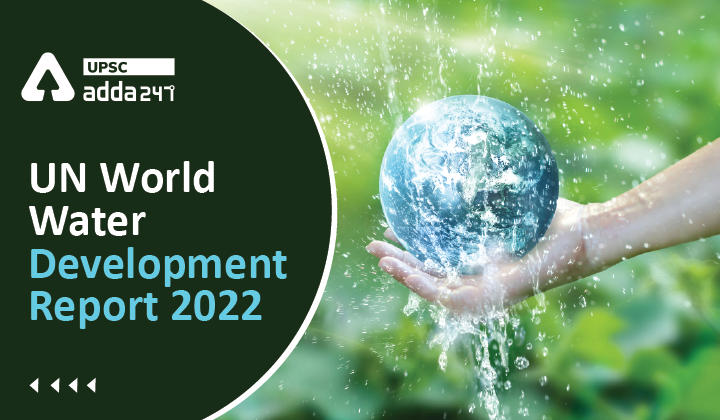Table of Contents
UN World Water Development Report : Relevance
- GS 1: Geographical features and their location-changes in critical geographical features (including water-bodies and ice-caps) and in flora and fauna and the effects of such changes.
Groundwater use: Context
- Recently, UNESCO on behalf of UN-Water has released the 2022 edition of the United Nations World Water Development Report entitled ‘Groundwater: Making the invisible visible’.
- Launched in conjunction with World Water Day, the report provides decision-makers with knowledge and tools to formulate and implement sustainable water policies.

UN World Water Development Report :Key points
- The report describes the challenges and opportunities associated with the development, management and governance of groundwater across the world.
- The report recommends states to commit themselves to developing adequate and effective groundwater management and governance policies in order to address current and future water crises throughout the globe.
UN World Water Development Report 2022: Key findings
- Globally, water use is projected to grow by roughly 1% per year over the next 30 years.
- Moreover, our overall dependence on groundwater is expected to rise as surface water availability becomes increasingly limited due to climate change.
- Groundwater withdrawal rates have more or less stabilized in the United States of America (USA), most European countries and China.
- Asia has the largest share in global freshwater withdrawal. It is followed by North America, Europe, Africa, South America and Australia & Oceania.
- Sector wise groundwater use: 69% of the total volume is abstracted for use in the agricultural sector, 22% for domestic uses and 9% for industrial purposes.
Importance of groundwater
- Less polluted: Due to the huge volumes of groundwater, aquifers can serve as a buffer in times of water scarcity, enabling people to survive in even the driest of climates. Aquifers are comparatively well protected against pollution incidents on the surface.
- Societal benefits: Groundwater provides societies with tremendous opportunities for social, economic and environmental benefits, including potential contributions to climate change adaptation.
- Urban poverty reduction: Groundwater contributes to urban poverty reduction by allowing water utilities to develop sources at much lower cost and allow lower connection charges.
- Achieve SDG: Groundwater is central to the fight against poverty, to food and water security, to the creation of decent jobs, to socio-economic development, and to the resilience of societies and economies to climate change. Hence, groundwater contributes in the development of many SDGs.
Groundwater challenges
- Though groundwater is less prone to pollution than surface water, once it is contaminated, it can be extremely difficult and costly to remedy.
- In coastal areas, the over-exploitation of groundwater resources exposes aquifers to large-scale saline-water intrusion.
- More than half of all groundwater under the globe’s land surface is saline and therefore unsuitable for most types of water use.
- Groundwater is often poorly understood, and consequently undervalued, mismanaged and even abused.

Groundwater use: Steps needed
- Collection of data: The issue of the lack of groundwater data can be improved by roping in private sector in the acquisition of data and information, which is usually under the responsibility of national (and local) groundwater agencies.
- Strengthen environmental regulations: As groundwater pollution is practically irreversible, it must be avoided. It is imperative that governments assume their role as resource custodians to ensure that access to groundwater are distributed equitably and for sustainable use.
- Reinforce human, material and financial resources: The commitment of governments to build, support and maintain institutional capacity related to groundwater is crucial.
- Steps taken by Government of India
Read current affairs for UPSC
| Women Transforming India Awards (WTI) | Hydrogen-based Advanced Fuel Cell Electric Vehicle | Parliamentary Panel Report on MGNREGA | Colombo Security Conclave (CSC) |
| I-Sprint’21 and InFinity Forum 2021| The Global FinTech Hackathon | India’s Arctic Policy | National eVidhan Application (NeVA) | Indian Standards for Drinking Water | Bureau of Indian Standards (BIS) |
| Sovereign Green Bonds | National Rail Plan Vision 2030 | India Cooling Action Plan | Maternal Mortality Ratio (MMR) Declines | Registrar General of India |
| RBI Releases Regulatory Framework for Microfinance Loans Directions, 2022 | PLFS Quarterly Bulletin April-June 2021 | Global Entrepreneurship Monitor (GEM) Report | Kanya Shiksha Pravesh Utsav Abhiyan |



 TSPSC Group 1 Question Paper 2024, Downl...
TSPSC Group 1 Question Paper 2024, Downl...
 TSPSC Group 1 Answer key 2024 Out, Downl...
TSPSC Group 1 Answer key 2024 Out, Downl...
 UPSC Prelims 2024 Question Paper, Downlo...
UPSC Prelims 2024 Question Paper, Downlo...




